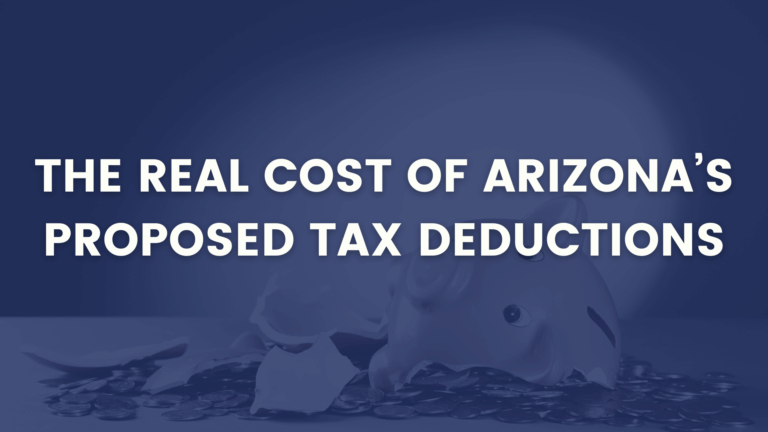
Paid Family Leave in Arizona Would be Good for Working Families and the Economy
Nearly everyone needs to take time off from work at some point to care for a sick family member, a new child, or to deal with a serious personal illness. That leave can come at a significant price if it means lost wages or even loss of a job. Providing Arizona workers with paid family and medical leave will encourage economic growth, promote a healthy business climate, and put families first. Not surprisingly, a recent poll finds 71% of likely Arizona voters support a paid family and medical leave program.
Only 17% of workers in the United States have access to paid family leave through their employers and fewer than 40% have access to personal medical leave through employer-provided short-term disability insurance. A disproportionate number of those in communities of color do not have access to paid leave at all. Approximately 80% of African Americans and 62% of Latinos say they would face a financial hardship if they were to take a few months of unpaid leave.1 A state paid family leave program creates an equitable system that ensures that all Arizonans can fully participate in and benefit from Arizona’s economy.
There is no federal or state law entitling workers to paid family and medical leave. The only federal leave law is the Family and Medical Leave Act (FMLA), which requires employers with 50 or more employees to provide 12 weeks of unpaid, job-protected leave to care for a new child (by birth or adoption), one’s own serious medical condition or a serious medical condition of a close family member.
Unpaid family and medical leave unfairly affects low-income Arizonans. Because of eligibility requirements, only about 60% of workers are covered by the FMLA. Additionally, only about half of those who are eligible for FMLA leave can afford to take unpaid time off. As for voluntary paid leave programs by employers, only about 16% of private sector Arizonans work for employers that offer designated paid family leave that can be used to care for a new child or ill loved one and only 40% have personal medical leave through an employer’s temporary disability insurance plan.
Paid family leave is good for families and Arizona’s workforce
As the elderly population continues to grow, so does the number of people who are involved in informal caregiving of older family members. According to the Bureau of Labor Statistics, 16% of the employed civilian population provided unpaid care to someone with an aging-related condition. Unpaid family caregiving has become the most common source of long-term eldercare, and adults who receive support from family members have better health outcomes. According to a 2011 Gallup survey, 17% of working Americans said they also assist with the care of an elderly or disabled family member or friend. It was also found that such individuals missed an average of 6.6 days of work annually due to caregiving responsibilities. Of those workers who assist with adult caregiving, 46% are men. Gallup estimates that the cost of lost productivity caused by absenteeism among full-and part-time working caregivers is $28 billion a year.
Because of the lack of paid family leave programs, nearly one in four mothers in the United States return to work within two weeks of giving birth because they cannot afford to go without pay. This fact, which disproportionately impacts low-income families and women of color, directly contributes to poor infant and maternal health. According to research, providing paid family leave could bring down the rate of infant mortality.2 It will have positive outcomes for Arizona’s workforce, too. Arizona ranks as the third lowest state in the nation for women’s participation in the workforce. In one national survey of college-educated women with children, 72% reported pausing their careers, with the vast majority stepping out of the workforce after having children because they didn’t have the maternity leave they needed.3 In contrast, women are more likely to stay in the workforce and report increased wages if they take paid family leave after a child’s birth.
Paid family leave is good for business
Paid family leave would not only protect many Arizona working families but will also be good for employers as well. Although employers will experience modest increases in payroll costs through participation in this program, companies with an employee who takes leave will save the cost of that employee’s salary for the duration of the leave period. This savings on wages will help to offset the cost of hiring a temporary worker or paying overtime to other employees. In addition, those employers will likely see savings associated with the return of the employee on leave, with fewer dollars spent on hiring and training a new worker. In addition, employers will benefit from higher productivity, improved employee morale and lower turnover and absenteeism. Small businesses will be able to better compete with larger companies since paid family leave will be universally available within the state.
How a paid family leave program could work in Arizona
Paid family leave programs already exist in several other states. They operate like other social insurance programs (Social Security or unemployment insurance). Small contributions by employers and employees are pooled and then when an employee has a qualifying reason for paid leave, they receive wage replacement from the state program. Workers are entitled to twelve weeks of medical or family leave to care for their own serious illness or for the care of blood, legal or chosen family members. Lowincome workers would be entitled to full wage replacement with a reduced wage replacement for other workers, depending on their income level. A paid family leave law would also provide job protections so that employees returning from a covered leave will be entitled to be restored to their same position without loss of other employment benefits and penalties for employers who retaliate against employees for taking leave. Such paid family leave laws in other states have been shown to be a win-win for employees, families and employers.
Arizona should promote public policies to ensure that people can care for themselves and their families without jeopardizing their jobs or economic security. Our public policies need to change to keep up with the new demands of this economy on working families. Having paid family leave will enable Arizona workers to maintain basic spending levels on things like food, utilities, and repairs – contributing to overall stability for families, communities and a growing economy.



